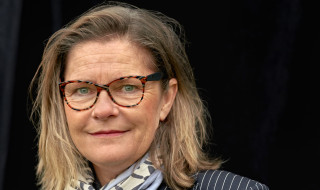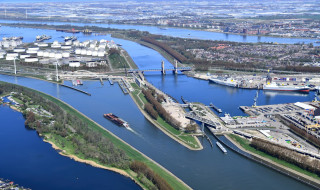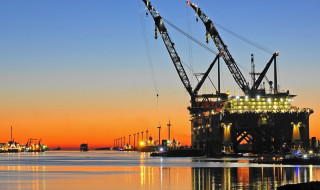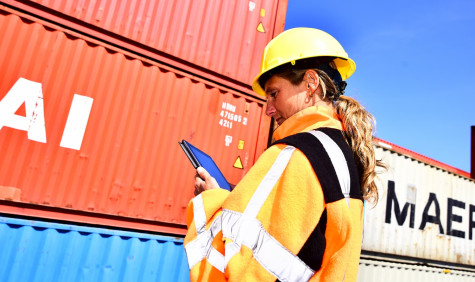"This does mean that all noses have to be in the same direction. And that we sometimes dare to jump over our shadows."
"If we want to work together, we need to speak the same language"
Anyone comparing the robust activity in the port to the structured world of education would expect the focus on IT at the Rotterdam Port Authority to be miles away from that at SURF. In contrast, Claudia de Andrade de Wit, ultimately responsible for digital infrastructure, surprisingly names many areas of focus that will seem familiar to us.
"Because we need to ensure the continuity of our business around the clock, security is paramount. Cyber resilience has a high priority. Not only with us, but also with the parties we work with in the port."
Speaking is Claudia de Andrade de Wit. On the eighteenth floor in the headquarters of the Rotterdam Port Authority, where she has held the position of Director of Digital & IT since 2018, we look out over the city and its economic lifeline, the river Maas. In the distance, the contours of the place where the slogan 'not words, but deeds' is put into practice every day. And we are not talking about 11 footballers in De Kuip.

Claudia de Andrade de Wit, director Digital & IT Port of Rotterdam Authority
"The port of Rotterdam covers about 40 kilometres and runs roughly from the Van Brienenoord Bridge to Hoek van Holland. We lease the land to parties we believe can make a sustainable contribution to the future of the port. As land manager, we ensure optimal public infrastructure, and in our role as harbour master, smooth and safe shipping traffic is paramount."
Smart Followers
Talking about the IT infrastructure and processes that make our global port accessible, it becomes clear that your main focus is on data exchange, rather than heavy computing facilities or super-fast network connections.
"The volume of our data traffic is not too bad. We are more interested in good agreements on standardisation, connectivity and smart links such as api's. So that we give access to our systems at any time of the day, but can ourselves also access those of, say, Singapore. We call that the Green Corridor. When it comes to innovation and new technology trends, our organisation is not really at the forefront. I see us more as 'smart followers'. Our goal is a digital integration of the port, in which the various stakeholders in our ecosystem of location, infrastructure, transport and logistics seamlessly exchange data and work together. Preferably in a sustainable, efficient and safe way. This does mean that all noses have to be in the same direction. And that we sometimes dare to jump over our shadows.To take one for the team,' as our new CEO Boudewijn Siemons calls it."
So working together requires a lot of consultation. Do you think a future-proof port expressly requires looking beyond national borders?
"We are a member of the International Maritime Organisation (IMO) which plays an important role in standardising data. This is a long and complicated process. For a long time, for instance, we used water levels in NAP (Normal Amsterdam Level), while the rest of the world talks about LAT (Lowest Astronomical Tide). There are European initiatives to ensure that ships only need to register in one system and that all relevant data are as easily retrievable in Antwerp as in Rotterdam. Also by relevant public parties and government agencies such as customs."
The same language
In the port, we work with berths for ships, and thus with location data. This allows the transport industry, among others, to identify where their trucks should go. But how do you actually identify such a berth?
"Strangely enough, we have never been able to reach good international agreements on that. Fortunately, after 10 years of intensive consultations, we recently managed to do so, which means that all ports are now busy adapting all systems. That seems a simple operation, but there are hundreds of parties who depend on information about moorings. So it is very important that everyone speaks the same 'language' to make such an ambitious and multi-year project a success."

Photo: Danny Cornelissen for Port of Rotterdam Authority
Smart use and analysis of data provides a lot of knowledge. Can you also make money from it by offering that data in the market?
"That idea was part of a business model we put a lot of energy into about seven years ago. In the end, we came back from this idea. As a port authority, we prefer to take a neutral position. We are an organisation that brings different parties together. Just like SURF does from the cooperative idea. So it would be curious to make money from the data provided by these parties themselves. That doesn't feel right and doesn't fit with the organisation we want to be."
Security
"The port is a large community of over 6,000 companies. These are all connected to Portbase, a data hub that we, together with Amsterdam, own. It is a great system for public-private collaboration, but also for business-to-business applications. We engage many partners to look at the future of the port with us. For a long time, our innovation was focused on improving efficiency in the supply chain. With all the geopolitical developments, that focus is shifting more towards themes such as 'safety' and 'security of supply'. We are increasingly deploying AI to achieve, for example, integrated planning of all shipping traffic. As dozens of parties are willing to share their data, the algorithms are getting smarter and smarter."
"We work in a fragile ecosystem. Then the door should not be left ajar."
In an interview recently, you said: 'The chance of a targeted cyber attack on companies in the port of Rotterdam is real.' From which corner do you expect such an attack to come and how do you arm yourselves against it?
"Deploying ransomware has become a kind of business model for criminals. There are still too many companies that have not secured themselves properly or are lagging behind in terms of knowledge level. We work in a vulnerable ecosystem. Then the door should not be left ajar. We see that the threat from Russia is becoming heavier and more intense, with many European ports being targeted due to recent geopolitical developments. As a result, the number of DDoS attacks is increasing on a scale that is almost unimaginable. Partly for this reason, my team has expanded considerably. Meanwhile, we have changed from an organisation that only directed processes to one that also interferes with content. Still, we too regularly look for specialists when it turns out we don't have the knowledge on-premises ourselves."

Photo: Kees Torn for Havenbedrijf Rotterdam
Collaboration sometimes also creates tension: Where do you take the lead yourself and where do you leave the initiative with the partners you are working with?
"We are in the middle of a transition in which we are moving away from our drive to be first and best. This means we no longer see other ports as competitors. And so we are talking about cooperation models. Rigorously increasing a market share almost always comes at the expense of someone else. If in Antwerp containers are going greener through the port, Antwerp deserves credit for that and it is up to us to learn from it. Ultimately, it's about a more sustainable world and not the honour of one fanatical port company."
Text: Edwin Ammerlaan
Claudia de Andrade De Wit
Claudia de Andrade de Wit is Director Digital & IT at the Rotterdam Port Authority, board member of the CIO Platform Netherlands and member of the Cyber Security Council. From her director position, she is responsible for IT within the Port Authority; from systems and data to infrastructure and the port-wide fibre-optic network. She also works with Portbase, the data hub of the port community. Claudia de Andrade de Wit will be one of the guest speakers on 9 October in Rotterdam during the SURF Summit 2024, the annual event for board members, CSCs and other (administrative) relations in the SURF cooperative.
